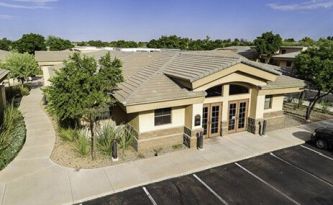Diagnostic Laparoscopy For Infertility
Laparoscopy is a minimally invasive surgical procedure that allows reproductive surgeons to diagnose and treat pelvic pathology, such as endometriosis, pelvic adhesions, tubal disease, fibroids, ovarian cysts (FIGURES 1 and 2). Laparoscopy is generally performed as an outpatient procedure or same-day surgery under general anesthesia. After the patient is asleep, a 5-12 mm incision is made in the umbilicus (belly button), so that the abdomen can be inflated with carbon dioxide (CO2) gas, and a long, thin camera lens, or laparoscope, can be introduced into the pelvic cavity (see FIGURE 1). Frequently, one to three additional incisions are made near the lower waistline or above the pubic bone so that additional instruments can be introduced and used by the surgeon to carefully inspect the pelvis for abnormalities and to address any problems that are found. Laparoscopic surgery usually takes between 1 and 3 hours. Afterward, the small incisions are closed with tiny sutures under the skin. Patients typically go home after 1-2 hours of observation at the surgical facility and will be able to return to most day-to-day activities the following day.
The knowledge and skills of the surgeon are critical to ensuring the best results with any surgical technique. The fertility surgical specialists at Arizona Center for Fertility Studies have tremendous experience and expertise with laparoscopic surgery and are committed to keeping their patients and their future fertility safe during all surgical procedures.
Laparoscopy is used both for diagnosis and treatment. It may be recommended for:
- Evaluation of unexplained infertility or pelvic pain. Treatment of endometriosis by excision, laser vaporization, or cautery.
- Removal of scar tissue and pelvic adhesions.
- Repair of damaged fallopian tubes (neosalpingostomy).
- Removal of ovarian cysts.
- Removal of uterine fibroids.
- Diagnosis and treatment of mullerian anomalies.
- Laparoscopic ovarian drilling for PCOS.
- Evaluation and treatment of tubal (ectopic) pregnancies.
- GIFT/ZIFT procedures.
- Ovarian transposition for fertility preservation.
-
Ovarian tissue harvesting for
fertility preservation.
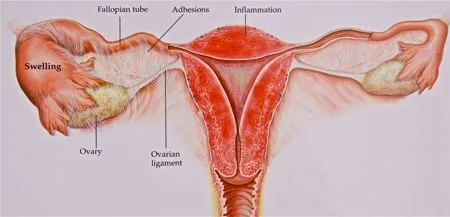
FIGURE 1. A graphic representation of an ovarian cyst (left) and adhesions due to endometriosis.
- Diagnosing a woman for possible appendicitis or infection of her fallopian tube, known as salpingitis or pelvic inflammatory disease (PID)
- Evaluation of unexplained infertility. In at least 25% of women with unexplained infertility, diagnostic laparoscopy will reveal endometriosis or pelvic
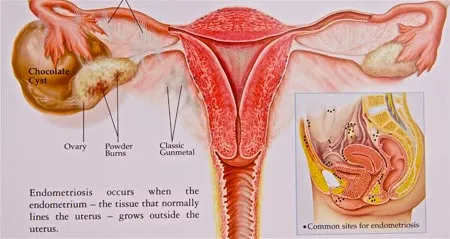
FIGURE 2. Adhesions surrounding the fallopian tubes and ovaries can reduce fertility by inhibiting effective egg, sperm, and embryo transport.
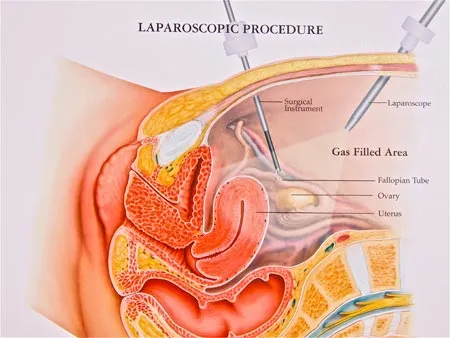
FIGURE 3. FIGURE 3. Illustration of a laparoscope placed through the belly button and an additional instrument inserted above the pubic bone.
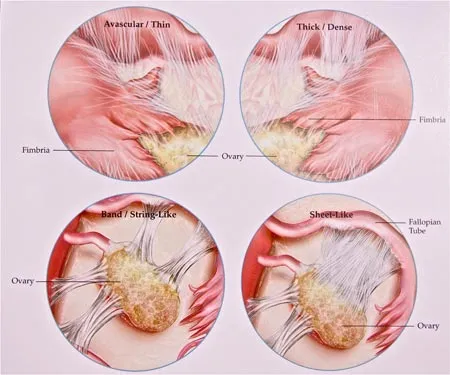
Examples of adhesions, or scar tissue, surrounding the ovaries and fallopian tubes.
The experience and expertise of the reproductive surgeon make all the difference in having an outcome that preserves future fertility and childbearing potential and safeguards against any serious complications. Adverse events from anesthesia are also rare in young healthy women of reproductive age. The physicians at Arizona Center for Fertility Studies have a tremendous amount of experience and expertise with laparoscopic surgery and are committed to keeping their patients safe during and after surgery.
If you want to learn more about laparoscopies, call your ACFS fertility team today at (480) 860-4792.





